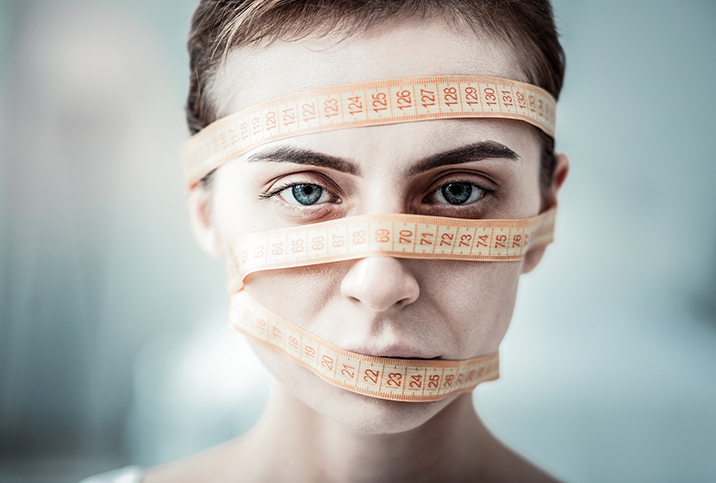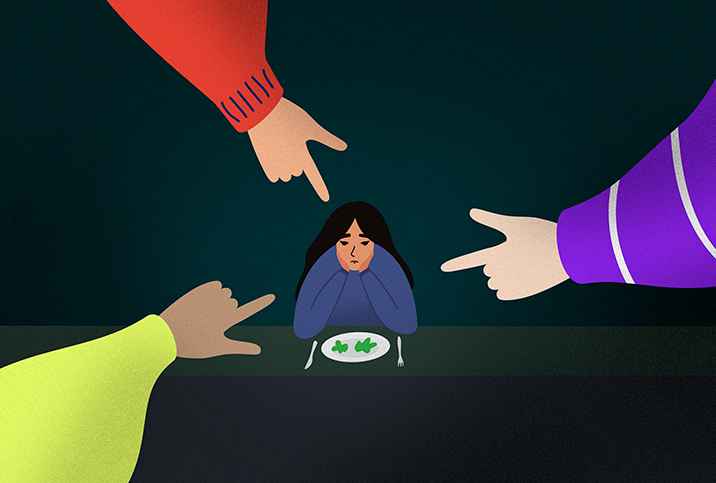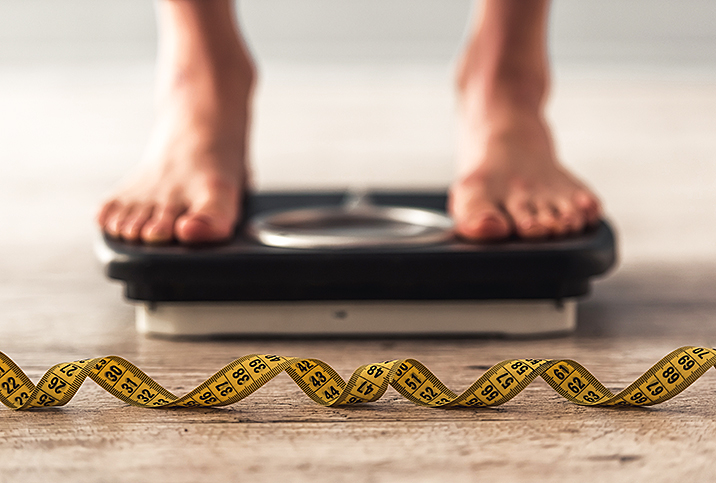The Meteoric Rise of Eating Disorders During the Pandemic

On the evening of March 16, 2020, I felt that my eating disorder was—while certainly not completely cured—under control.
After all, I wasn't 84 pounds anymore. I no longer went weeks at a time eating only vegetable broth and mustard, nor was I throwing up every night or even every week. After a nearly decade-long absence, I had my period back. The persistent symptoms of my eating disorder's 13-year reign—compulsive tummy checking, a zealous workout schedule, a habit of drinking salsa off chips and then politely tucking the uneaten chips under my napkin—felt manageable. Cute, even.
Then came March 17, 2020, when I awoke to discover a city shut down, the cafe where I wrote transitioned to takeout only and my kickboxing gym shuttered. I realized, with mounting panic, that this meant I'd be trapped in a one-bedroom apartment without my coping mechanisms. I'd be all alone, except for a refrigerator, cupboards of food, a DoorDash account and an eating disorder that was growing harder to ignore with every day under COVID-19 lockdown.
During the best of "normal" times, it was easy to convince everyone, myself included, that nothing was wrong. No one had a problem with my constant workouts or my forever restaurant order: "Salad, no cheese, no meat, no dressing," mumbled apologetically. In fact, these elements of my personality were often applauded. "You are so healthy!" my co-workers exclaimed whenever they caught me counting my almonds or microwaving my daily lunch of steamed broccoli and Brussels sprouts (in retrospect, a cruel choice for an in-office meal).
But within the first few weeks of the pandemic, my eating habits went from manageable to mutinous. Hunched over the toilet throwing up bile for the umpteenth night, I couldn't convince myself otherwise any longer. Something was definitely wrong. I was experiencing an eating disorder relapse.
Eating disorders during the pandemic
I wasn't the only one forced to take a hard, lonely look at eating and body image issues during lockdown. Over the course of the pandemic, doctors have seen a meteoric rise in eating disorder symptoms in the United States and internationally. Data from a national health insurer revealed hospitalization rates for eating disorders roughly doubled during the second half of 2020 compared to the rates in the previous two years. These disorders included anorexia nervosa, in which people deprive themselves of food; bulimia nervosa, where people binge on food and purge it by throwing up or using laxatives; and bingeing, when people eat excessive quantities in a short period. People who were hospitalized stayed around 50 percent longer, suggesting their conditions were more severe. During the two-year time period, the National Eating Disorders Association (NEDA) reported increases in calls to its helpline were as high as 107 percent.
The increases were—to use a pandemic-era word we're all sick of—unprecedented. Tina Laboy, R.D., a medical nutrition therapist in Austin, Texas, said she'd never seen anything like it in her 14 years of working in the eating disorder field. During normal times, Laboy saw an "ebb and flow" of requests for help with eating disorders.
"Then the pandemic hit and it was nonstop busy for two-and-a-half years," Laboy said. "We had a huge waitlist. It was the most intense period of my company's life."
The pandemic shone a light on a lot of problematic behaviors that might have otherwise been overlooked.
"We started seeing people that maybe wouldn't have come in for help because their disordered eating was normalized by society," Laboy added.
She said people from all walks of life put in requests for help; not only people with histories of eating disorders and mental health concerns but "high-functioning" individuals and children, too. The majority of Laboy's clients came from a place of relative privilege, but she emphasized that not everyone has the insurance or means to seek treatment. People of all income levels and ethnicities experience eating disorders at similar rates, though eating disorders are underdiagnosed and undertreated among minorities and people from socioeconomically disadvantaged backgrounds.
Reasons behind the rise
According to Alexa Shank, M.S., L.P.C., an eating disorder counselor in Houston, the pandemic created a perfect storm of risk factors for eating disorders.
"During quarantine, there was a significant disruption in school schedules, work, extracurricular activities and social events, all of which added to increased isolation, loneliness, depression and anxiety," Shank said. "These emotions frequently fuel the emergence of eating disorders as people may turn to food for comfort, a sense of control when everything else feels out of control."
That "sense of control" might also exhibit itself as restricting food intake, purging food, bingeing on food or overexercising, according to Laboy.
"People need people. People need community," she explained. "When you remove that community from people, it's natural they went to kind of these harmful habits."
Life after lockdown
People are returning to schools, the office and their social lives. But the healing process has been slow for many people with eating disorders.
"People are having a hard time picking themselves up from the trauma they've experienced in the last two, two-plus years," Laboy said.
In a somewhat desperate search for a silver lining, Laboy was asked if the pandemic has taught us any valuable lessons about eating disorders.
"The pandemic brought more awareness about the massive divide in resources," she said.
Cost is a huge barrier to eating disorder treatment, and even patients with insurance struggle to get treatment. Financial barriers extend to logistical concerns, too, like taking time off work or obtaining childcare.
In addition to highlighting the dire issue of disparity of access to mental healthcare in the United States, this point reminded me of my own reasons to be grateful. Fortunate enough to have access to therapy and nutrition counseling, and the means to pay for healthy outlets like yoga and improv, I'm definitely on the privileged side of the divide. And, to end on a note of hope, all the support has helped: My eating disorder relapse episodes are few and far between these days, and sometimes, I eat my salsa with chips.


















